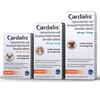CARDALIS
This is a prescription item
We’ll collect your veterinarian’s information at checkout to authorize the prescription.

Don’t have a veterinarian? Book an appointment with Vetster
 Out of stock
Out of stock
 Thank you, we will notify you when this product is available.
Thank you, we will notify you when this product is available.
What is CARDALIS™?
CARDALIS™ is a unique chewable tablet combining the two active ingredients used to treat dogs with Congestive Heart Failure - Spironolactone and Benazepril.
Suitable for:
Dogs
Benefits:
- Available in 3 strengths to cover all body weights
- Half-scored, chewable, small tablets for easy administration
- Tablets are beef-flavored and non-allergenic
- Recommended by ACVIS guidelines
How does CARDALIS™ work?
CARDALIS™ combines two active ingredients recommended in the American College of Veterinary Internal Medicine (ACVIM) 2019 consensus guidelines for the management of CHF with once daily dosing. This palatable combination may significantly reduce the number of pills and the number of times an owner needs to give medications to their dog on a daily basis.
Caution:
The safety of CARDALIS™ has not been evaluated in growing dogs. Spironolactone has an antiandrogenic effect and should be used with caution in growing dogs. The safety of CARDALIS™ has not been established in pregnant, lactating or breeding dogs. Do not administer CARDALIS™ to dogs with hypoadrenocorticism (Addison’s Disease), hyperkalemia, or hyponatremia. Do not administer CARDALIS™ to animals with known hypersensitivity to ACE inhibitors or spironolactone. CARDALIS™ is only for use in dogs with clinical evidence of heart failure.
Storage:
Keep out of reach of children and pets. Store at or below 68 to 77°F (20 to 25°C)
Brand Name:
CARDALIS™
Generic Name:
Spironolactone and Benazepril hydrochloride (8:1)
What is the most important thing I should know about Cardalis?
CARDALIS™ has shown a faster improvement in clinical signs compared to Benazepril alone.
What should I discuss with my veterinarian before giving CARDALIS™ to my pet?
Renal function and serum potassium levels should be evaluated prior to initiating treatment with CARDALIS™. Regular monitoring of renal function and serum potassium levels is recommended as there may be an increased risk of hyperkalemia.
How should CARDALIS™ be given?
CARDALIS™ should be administered orally once daily with food.
What are the potential side effects of CARDALIS™?
Adverse reactions may include urine abnormalities, fluid in abdomen, ataxia, weight loss, digestive tract disorder, hypertension, electrolyte disorder, bronchitis, and hyperactivity
What happens if I miss giving a dose of CARDALIS™?
Give the missed dose with food as soon as you remember and resume a regular dosing schedule.
What happens if I overdose my pet on CARDALIS™?
In case of accidental overdose, induce vomiting, lavage the stomach (depending on risk assessment), and monitor electrolytes. Symptomatic therapy (e.g. fluid therapy) should be provided as medically necessary.
What should I avoid while giving CARDALIS™ to my pet?
Care should be taken when using CARDALIS™ in dogs with hepatic dysfunction.
What other drugs will affect CARDALIS™?
Do not administer CARDALIS™ in conjunction with non-steroidal anti-infl¬ammatory drugs (NSAIDs) in dogs with renal insufficiency. The safety and effectiveness of concurrent therapy of Cardalis with Pimobendan has not been evaluated
CARDALIS™ Directions:
- CARDALIS™ administration should begin after pulmonary edema is stabilized.
- CARDALIS™ should be administered orally once daily at a dose of 0.9 mg/lb (2 mg/kg) spironolactone and 0.11 mg/lb (0.25 mg/kg) benazepril hydrochloride, according to dog body weight using a suitable combination of whole and/or half tablets.
- All tablet strengths are scored and the calculated dosage according to dog’s weight should be to the nearest half-tablet increment.
CARDALIS™ should be administered with food.
CARDALIS™ Dosage:
| Weight | Dosage |
|---|---|
| 5.5 to 10.9 lbs | 1/2 CARDALIS™ 20/2.5 tablet |
| 11 to 21.9 lbs | 1 CARDALIS™ 20/2.5 tablet |
| 22 to 43.9 lbs | 1 CARDALIS™ 40/5 tablet |
| 44 to 87.9 lbs | 1 Cardalis 80/10 tablet |
| 88 to 131.9 lbs | 1 ½ CARDALIS™ 80/10 tablets |
| 132 to 176 lbs | 2 CARDALIS™ 80/10 tablets |
| Cats | Do not use! |
|---|
| Horses | Do not use! |
|---|
CARDALIS™ Ingredients:
| Active Ingredients | Amount |
|---|---|
| Spironolactone | 20 mg |
| Benazepril HCl | 2.5 mg |
| Active Ingredients | Amount |
|---|---|
| Spironolactone | 40 mg |
| Benazepril HCl | 5 mg |
| Active Ingredients | Amount |
|---|---|
| Spironolactone | 80 mg |
| Benazepril HCl | 10 mg |
 Swipe
Swipe
Use code SAVE35
Customers also boughtView All
 Swipe
Swipe












































